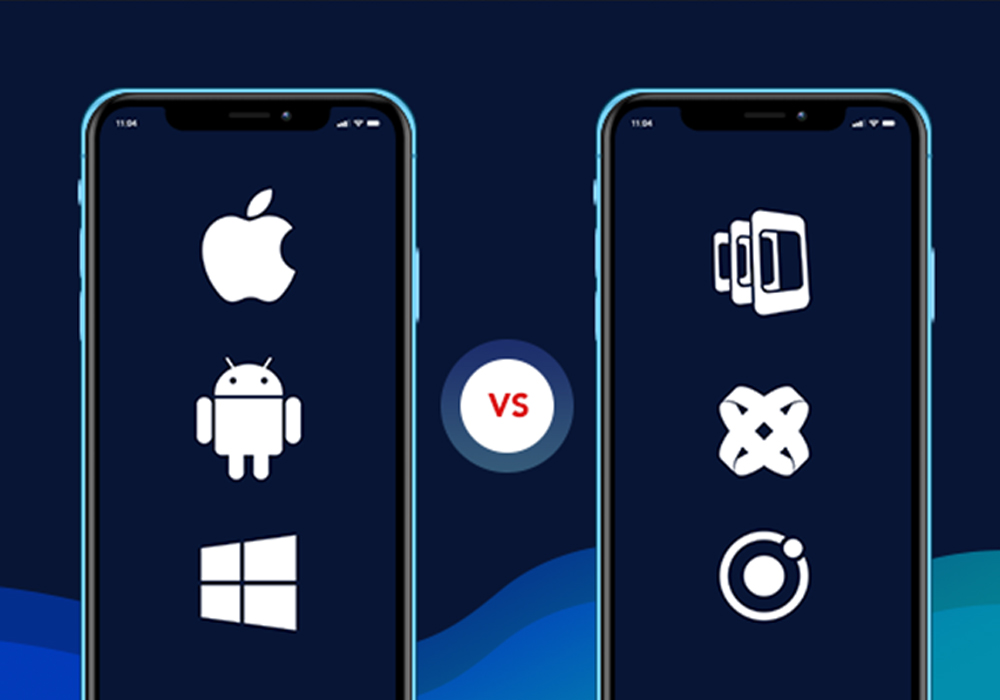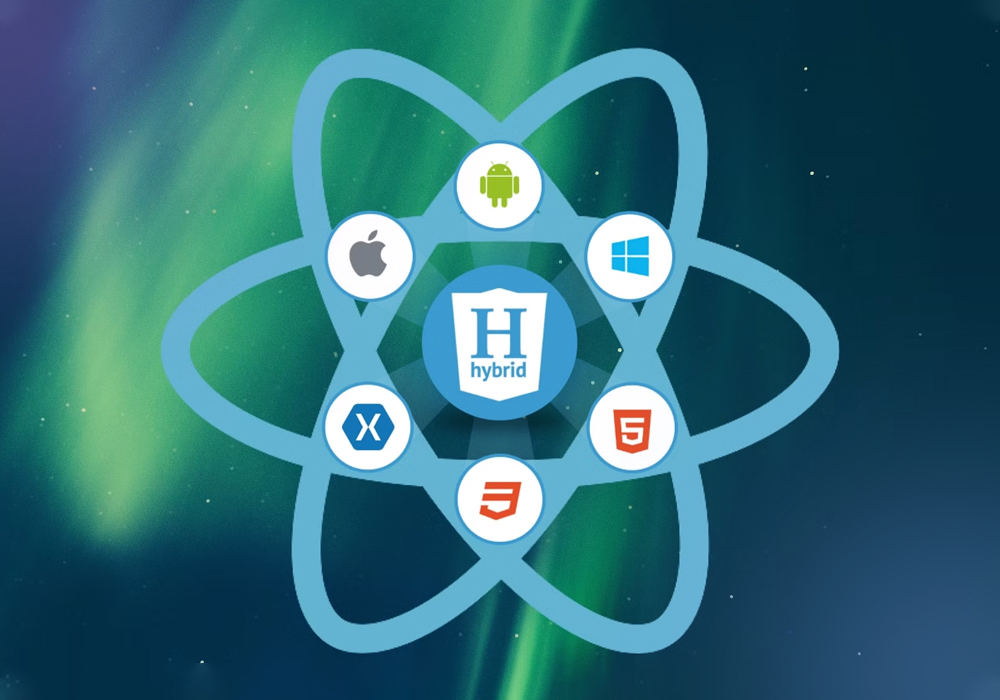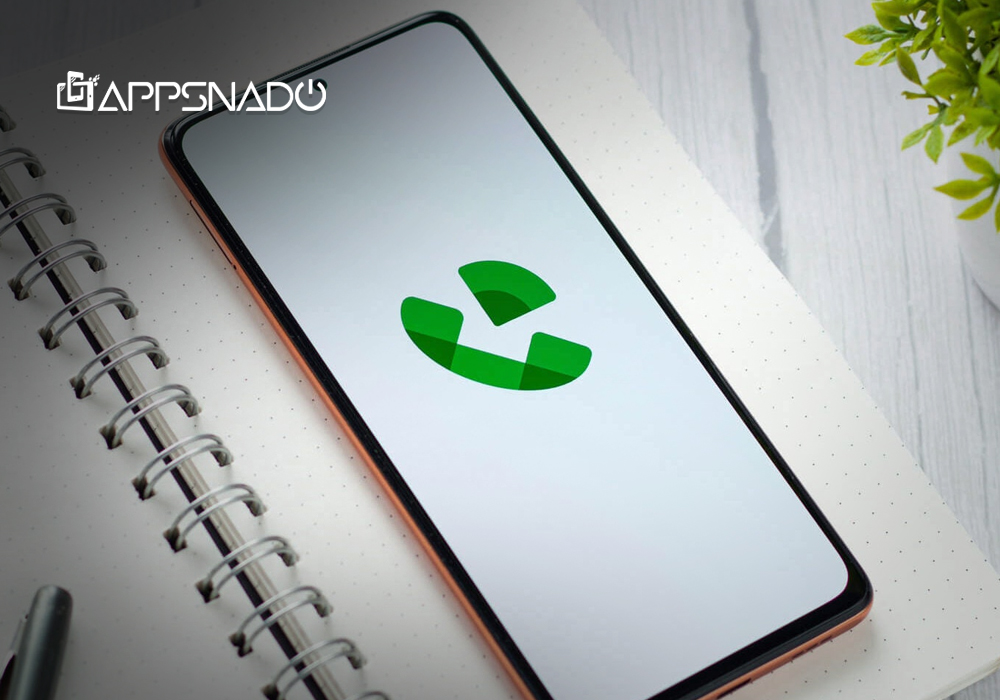Mobile app development; is a topic that has gained popularity in no time. The app development field did not limit itself to any one industry but has benefitted almost every sector in the world. From education to tourism, health care to banking, and retail to real estate, each industry has not one but multiple kinds of apps developed for various reasons. With the rise in numerous industrial apps came the increase in different applications. This article will focus on one such type, which is Hybrid Apps. Ever wondered what is a hybrid app? What are the advantages and disadvantages of hybrid applications? If yes, then without further delay, let’s explore the world of hybrid applications, along with highlighting the process of hybrid app development.
What Is A Hybrid Mobile App?
If you want to understand the concept of hybrid apps in simple words, the answer is that a hybrid app is a cross-platform app. The key feature of a cross-platform app is that it can be launched on multiple platforms. It is not designed for a specific platform like Android or iOS but is accessible to users on different app stores.
The question which then arises is how is it possible for an application to have a cross-platform launching feature. Mobile app developers have worked day and night to merge the nature of a native app with a web application and form the newest form of app development, hybrid apps.
Hybrid applications are apps that have the qualities of both native and web applications. You have to download these applications from the required app stores, like native apps. Still, once these applications are displayed, they have the unique quality of displaying web content like web applications. These apps are built in a native framework, usually called a native container, that utilizes the feature of WebView Object. This element enables the display of web content once the app is used.
We will further discuss the three kinds of applications in detail so that you can get a better understanding of hybrid apps and how they are unique from other apps.
You May Also Like: What Does The Frame Rate Of A Virtual Reality Headset Indicate?
How Is A Hybrid App Different From A Native App?

Native apps are platform-specific apps, unlike hybrid apps. These mobile applications are built for a single platform like Android, iOS, and Windows. They have nothing to do with web applications or web content, as their features are limited to general mobile application features. For instance, in order to develop a native app, mobile developers will have to use platform-specific programming languages like Swift or Objective-C for iOS and Kotlin or Java for Android Apps. If we look at the advanced nature of hybrid apps, these applications use a single code that is written on different hybrid-friendly platforms and can launch the app for other operating systems.
How Is A Hybrid App Different From A Web App?

Web applications are apps that can only be accessed through web browsers. They work just like any other downloaded application will, but there is no need to download them as you can easily access the web content through online browsers. The code for a web application is written using different programming languages such as HTML, CSS, or JavaScript. The difference between a hybrid app and a web application is that hybrid apps require to be downloaded from app stores; however, once they are accessed, these apps display the web content like web applications.
Core Differences Between Hybrid, Native, And Web Applications

Since hybrid apps are a mixture of native and web applications, people often get confused about the differences that make them unique. Below mentioned is a list of core differences among the three app kinds.
You May Also Like: How To Develop an E-commerce App For Mobile Phones
- Usage: The first difference between these applications is the mode of usage. Web applications are usable only through web browsers, whereas both native and hybrid apps require the app to be downloaded from an app store.
- Performance: Performance matters a lot while utilizing any app. Web applications are not commonly used as they have a slow performance rate as compared to native apps whose performance can be optimized or hybrid apps that guarantee fast performance
- Access: Native and hybrid apps both have the feature of one-step access as well as access to offline features. But web applications are limited to the access of browser and network connection.
- Cost: The cost range of native apps is much more expensive than both web and hybrid applications.
- User Experience: In terms of user experience, web applications have been seen to be inconsistent, less engaging, and less efficient as compared to native and hybrid apps.
Advantages Of Hybrid App Development
Since the types of different applications have been discussed along with their differences, it is time to move on to the advantages of hybrid app development.
- Cost-Effective
The developmental process of a hybrid application is a cost-effective process as compared to other types. It requires a single code to be deployed on multiple platforms. Hence, it eliminates the need to hire different professionals with various programming language expertise to build a new code every time an app needs to be developed.
- Scalability
The opportunity of scalability in a hybrid app makes it an effective technique for app development. The app developers create a single code for applications and can easily make necessary changes within the code as compared to customizing different codes each time an update is needed.
- Time-Saving
The most efficient and time-saving method of app development is developing a hybrid application. Apps are launched on multiple platforms within no time, as they do not require a lot of effort for code creation.
- Multiple Platforms
The unique feature of app available on multiple platforms gives the advantage of hybrid apps being preferred by the majority of app developers. This helps in targeting a wide range of target populations and increased user engagement and consumer usage.
- Networking Facilities
One of the most beneficial features of hybrid apps is offline access to these apps. Hybrid applications allow consumers to use applications or certain features of applications without the need for a network connection.
- Practical Marketing Tactic
Once a hybrid app is deployed on different platforms, it has the massive advantage of reaching out to various people. This gives the benefit of an easy marketing strategy for businesses and different industries as they look out for marketing solutions that save money, time, and effort.
- Ease Of Maintenance
Maintenance is an essential element of technological advancements and digital solutions. A single code-based hybrid application assures the ease of maintenance of the application for developers. Other than that, there are certain features of hybrid apps that support automatic updates of the app.
Disadvantages Of Hybrid App Development
The advantages of hybrid apps are many, but at the same time, it does have some disadvantages for the users as well as developers. Some of these disadvantages are
You May Also Like: A Step-by-step Guide On How To Become A Blockchain Developer
- Overlapping Of Operating Systems
The first disadvantage of a hybrid app is what defines the app itself. The unique feature of cross-platform accessibility might harm the app at times, as the code of the application contains a layer of various operating systems. This overlapping nature of OS might affect the overall performance of applications at times, causing the app to function at a slower rate.
- Difficulty In Testing
Since hybrid apps are designed for different platforms, the development team often finds it difficult to test them across these platforms.
- Glitches And Bugs
With the difficulty and complexity of the testing phase comes the time-taking process of detecting glitches and bugs on separate platforms and debugging the errors for each resource.
- UI/UX Design And Graphics
Lastly, it is easier to mess up the graphics of a hybrid app since different operating systems require different UI/UX designs. It is a difficult task for the developers to cater to the separate requirements of each platform and create an app that is presentable on each platform.
What is Hybrid App Development Process?

The hybrid app development process is not as complex as it is assumed by developers. Since it is a mixture of native and web applications, people assume that creating and designing them might ask for extra effort. In this section of the blog, we will discuss six stages that assure the creation of a functional hybrid app.
- Planning
The first step is the initial planning phase of the hybrid app you want to create. This phase includes
- Conducting prior market or competitor research.
- Identifying the target audience and understanding their needs.
- Making a plan of action along with deadlines.
- Determining the goals and objectives of the app.
- Deciding the app deployment platforms.
- Creating a skilled app development team.
- Deciding the monetization model and programming language for the hybrid app.
- Confirming the availability of different gadgets and resources needed for development.
- Designing The UI/UX Model
The next step includes designing a proper working UI/UX model for the hybrid app. This step is a crucial step as it requires the involvement of skilled professionals who understand the basics as well as the complexities of graphics, animation, 3D creations, etc.
- Development Of The App
Once the overall framework and image of your application are in front of you, it is time for the development team to start the process of front-end and back-end development of the hybrid app. It is necessary to pay attention to the details and requirements of the app to assure the creation of a creative hybrid app.
- Testing And Modifying
Once your hybrid app is ready to be tested, you can conduct the testing phase using various methods like launching an MVP, testing between the team members, etc. This step will further proceed to the step of detecting errors and bugs in your app and modifying them by debugging and tuning.
- Launching The Application
Lastly comes the step of launching the application on multiple platforms that you have chosen for deployment. It is necessary to follow the protocols of these platforms so that the launching process does not require additional time and your app can be deployed on a fixed deadline.
- Monitoring The Performance
Lastly, once the app is deployed, make sure to monitor customer engagement and usage of the hybrid app through data analysis. It is essential to pay attention to these little details as they will help you quickly update and build a reputation with customers.
You May Also Like: How To Learn Unity Game Development?
How Can A Mobile App Development Company Help You With Hybrid App Development?

A question most app developers and people with unique and innovative app ideas ask is where to begin the process from. The answer is simple and you have to look out for renowned and reliable app development companies that have worked with different mobile app developers and have benefitted various industries. With the statistical figures of $935 billion in revenue generation in 2023, mobile app developers have understood that app development will shake the economic sector in the upcoming years. Nowadays, digital companies offer their valuable expertise in different app development procedures that not only make the process easy but guarantee support and effective outcomes as well.
Conclusion
Hybrid app development is one of the most creative and helpful app development procedures in recent times. By focusing on the areas of detailing, utilizing the latest trends and tech features, and having strong back-end support, there is no doubt that hybrid app developers will benefit the app market as well as the app development sector.
FAQs Regarding Hybrid Applications
Q: What are some of the famous frameworks of hybrid app development?
A: Some of the famous frameworks of hybrid app development are Xamarin, Ionic, Aurelia, React Native, etc.
Q: Is a QA tester necessary to be present on a hybrid app development team?
A: Yes. It is necessary to have a QA tester on a hybrid app development team as they help in testing the app, identifying the bugs, and correcting the errors.
Q: Can I deploy my hybrid app on more than one platform?
A: Yes. Hybrid apps allow app developers to launch their apps on more than one platform using the same code.
Q: Is Xamarin a reliable source for hybrid app development?
A: Yes. Xamarin is one of the most useful frameworks for hybrid app development having multiple users throughout the world.
You May Also Like: How Is A Game Designer Different From A Game Writer?







